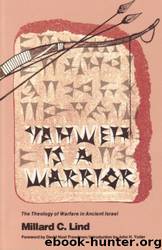Yahweh is a Warrior The Theology of Warfare in Ancient Israel by Millard C. Lind

Author:Millard C. Lind [Author, Unknown]
Language: eng
Format: epub
Published: 0101-01-01T00:00:00+00:00
The narrative of the deliverance of the city of Samaria from th^ Aramean siege (2 Kings 6:24—7:20) has many of the hallmarks of historical authenticity. It
contains reminiscences at close hand of historical realities; e.g., a siege of Saj maria by Aram, the reference to the Hittites and Musrites (7:6), as also minor details, e.g., the harrowing event of mothers eating their children by mutual bargain, with the king’s human indignation which he would vent extravaj gantly upon Elisha, and the humorous anecdote of the lepers' discovery of the abandoned camp. Also, Elisha again appears in a political role, as in 3:4 ff., here sitting in conclave with the civic elders, and assuming the offensive against the king in the spirit of Elijah and Micaiah.150
Assuming that the distress of the city was from Yahweh (i.e., that it was a judgment, v. 33), the king threatened the prophet. Elisha responded with an oracle that could be fulfilled only by an unusual act of Yahweh. The miracle is set forth in absolute terms in that Israel played no part whatsoever. The flight of the Aramean army was first discovered by four lepers who went out to give themselves up to the Aramean camp. Highlighting the effect of the miracle was the lengthy report of the discovery and the incredulity of the king and his officer. The Aramean flight was explained in terms of Yahweh’s war:
For Yahweh had made the army of the Syrians hear the sound of chariots, and of horses, the sound of a great army, so that they said to one another, “Behold, the king of Israel has hired against us the kings of the Hittites and the kings of Egypt to come upon us" (7:6).151
The narrative compares with the Song of־ Deborah in that many Israelities are mentioned: the king, a woman who had experienced an injustice, Elisha, the elders, the king’s messenger, the captain, the four lepers, the porters of the city, the king’s servants, and the people. Quite unlike the Song of Deborah, however, none of these persons participated in any way in the fighting. In this respect the account is similar to the Song of the Sea. Israel saw the victory as a result of the unilateral action of Yahweh.
A third narrative, in which neither prophet nor miracle are as decisive as in the above account, is that of Elisha and the three kings in the campaign against Moab (2 Kings 3).152 The account reflects the hostility of the prophet toward King Jehoram (w. 13 ff.). The prophet promised water without rain as well as victory over the Moabites. The Israelite army evidently approached Moab from the east (v. 22), and the water fell in the mountains of Edom. When the Moabite army rose in the morning they saw the sun shining on the water which was ‘Ted as blood.’’ The Moabite’s mistaking of water for blood is curious. John Gray suggests that
the sight of the red light suggesting the semblance of blood might have been taken
Download
This site does not store any files on its server. We only index and link to content provided by other sites. Please contact the content providers to delete copyright contents if any and email us, we'll remove relevant links or contents immediately.
The Lost Art of Listening by Michael P. Nichols(7506)
Why I Am Not A Calvinist by Dr. Peter S. Ruckman(4153)
The Rosicrucians by Christopher McIntosh(3521)
Wicca: a guide for the solitary practitioner by Scott Cunningham(3179)
Signature in the Cell: DNA and the Evidence for Intelligent Design by Stephen C. Meyer(3138)
Real Sex by Lauren F. Winner(3023)
The Holy Spirit by Billy Graham(2953)
To Light a Sacred Flame by Silver RavenWolf(2823)
The End of Faith by Sam Harris(2742)
The Gnostic Gospels by Pagels Elaine(2531)
Waking Up by Sam Harris(2461)
Nine Parts of Desire by Geraldine Brooks(2369)
Jesus by Paul Johnson(2363)
Devil, The by Almond Philip C(2333)
The God delusion by Richard Dawkins(2309)
Heavens on Earth by Michael Shermer(2285)
Kundalini by Gopi Krishna(2185)
Chosen by God by R. C. Sproul(2165)
The Nature of Consciousness by Rupert Spira(2108)
